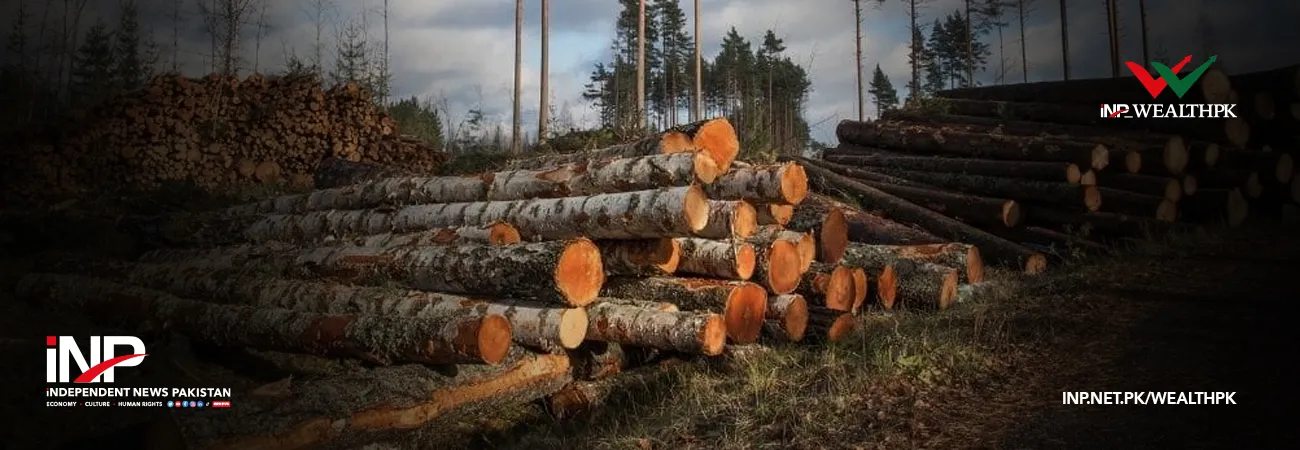INP-WealthPk
Amir Khan
Pakistan's forests are threatened, with deforestation a major concern. The forest cover is alarmingly low with just 4.83% of the land area, posing a dire threat to the country's environment and its people, Dr. Mazhar Hayat, a member of Intergovernmental Panel on Climate Change (IPCC), told WealthPK. “Pakistan's forests are a valuable carbon sink, storing an estimated 213 million metric tons of carbon in living forest biomass. This is equivalent to the annual emissions of over 40 million cars. Pakistan is also home to a rich diversity of wildlife, with over 1,000 known species of amphibians, birds, mammals, and reptiles. Of these, 3.5% are endemic, meaning they exist nowhere else in the world. Additionally, 5.5% of Pakistan's wildlife is threatened with extinction,” he said. Dr Mazhar further stated that Pakistan was home to a diverse range of forests, including juniper, deodar, oak, and chilgoza.
These forests are incredibly valuable, providing several benefits, such as regulating water flow, mitigating soil erosion, acting as carbon sinks, and nurturing medicinal plants. Continuing, he said the botanical richness of Pakistan was equally remarkable, with a diverse collection of over 4,900 vascular plant species. Notably, 7.5% of these plants are unique to Pakistan, while 4.0% of species are teetering on the brink of extinction. “The National Forest Policy of 2015 paints a bleak picture of deforestation in Pakistan. It estimates that the country loses approximately 27,000 hectares of forest annually. This is a significant amount of forest loss, and it is devastatingly impacting the environment. “One of the biggest threats to Pakistan's forests is deforestation. From 2004 to 2012, an average of 11,000 hectares of forest cover was lost annually. This loss has accelerated in recent years, with over 17,000 hectares of forest lost from 2008 to 2012.
The main drivers of deforestation are the insatiable demand for wood and conversion of forests to the agricultural land. “The demand for wood is being driven by a growing population and socioeconomic disparities. As more people need wood for fuel, construction, and other purposes, the pressure on forests increases. The forests are also being converted to agricultural land to meet the growing demand for food,” Dr Mazhar added. The Green Pakistan program is being implemented by the Ministry of Climate Change Division in the Fiscal Year 2023. It has a budget of Rs4,050 million through the Public Sector Development Programme. This funding would be used to support transformative projects that will rejuvenate forestry, wildlife, environment, and biodiversity resources across Pakistan. "Pakistan must adopt a comprehensive strategy for adapting to the climate change within its forested areas," emphasized Dr. Mazhar. This approach, as outlined by him, comprised several pivotal components.
The IPCC member underscored the significance of research-driven forest adaptation, stressing the necessity for collaboration with both national and international research institutions. This collaboration, he suggested, will augment Pakistan's understanding of the intricate ways in which climate change impacts its forests. Such knowledge, Hayat believed, was crucial in devising effective strategies aimed at safeguarding these ecosystems from the detrimental effects of climate change. He further highlighted the imperative of promoting sustainable forest management practices as a linchpin of climate adaptation strategies and suggested that Pakistan should institute and enforce practices that ensure responsible and sustainable forest management, underlining their potential to enhance the resilience of these ecosystems in the face of climate-induced challenges.
Moreover, elevating public awareness, as asserted by Dr. Hayat, assumes paramount importance. He underscored the necessity of prioritizing initiatives that amplify public awareness about the pivotal role forests play in the environment and the compelling need to adapt to climate change. Collaborative attempts with the civil society, in his view, held the key to educating forest-dependent communities and students about the profound importance of conserving these ecosystems. Lastly, Dr highlighted the urgency of enhancing Pakistan's adaptive capabilities through the training of skilled forest workers adept at addressing climate-related challenges. He emphasized the value of collaborating with international organizations to implement pilot projects within the forestry sector, seeing it as a strategic approach to constructing effective adaptation strategies.
Credit: INP-WealthPk













